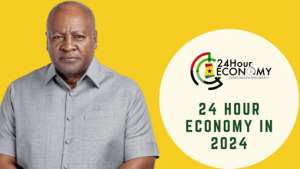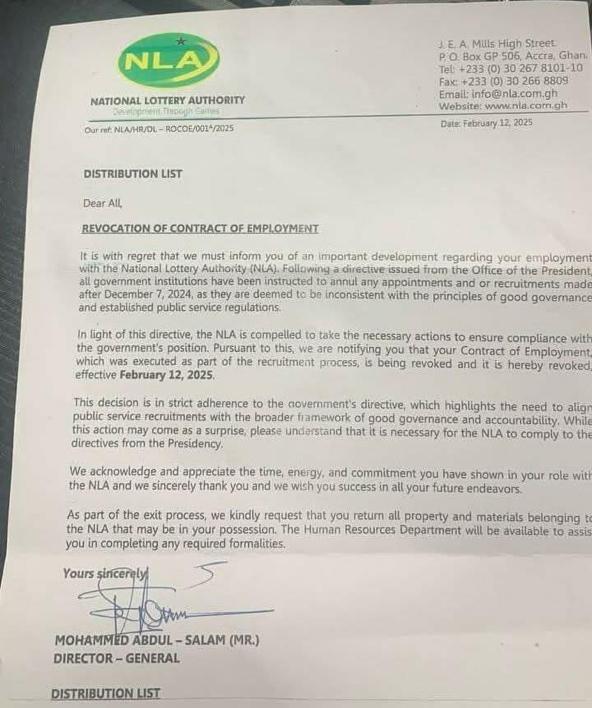
“Economic development is not about making promises; it is about making progress.” — Jeffrey Sachs
1. The NDC’s grandiose promise of a 24-hour economy was presented as a panacea for Ghana’s economic woes—a vision of an industrious nation with unceasing productivity, job creation, and economic expansion. But like a sandcastle built on the shifting dunes of the Sahara, this vision has crumbled under the harsh winds of reality. Instead of the promised job boom, mass layoffs have become the new norm, leaving citizens bewildered, betrayed, and bereft of economic security.
2. Economic historian Daron Acemoglu reminds us that “institutions, not slogans, determine prosperity.” The NDC’s rhetoric was heavy on slogans but lacked the institutional framework necessary to support a functional 24-hour economy. A vibrant, round-the-clock economic model requires robust infrastructure, stable electricity, strong security, and an educated workforce—elements that the NDC failed to establish before pushing their ambitious narrative.
3. The consequences of this broken promise extend far beyond Ghana, casting ripples into the wider Sahara region. The Sahara, a land often plagued by economic despair and political instability, has long been a breeding ground for extremist recruitment. When governments fail to provide economic stability, unemployed youth become susceptible to radicalization. As Nobel laureate Amartya Sen rightly posited, “Poverty is the absence of all human rights.”
4. Instead of propelling the economy forward, the NDC’s failure has created an economic vacuum, a dangerous situation in a region already burdened with fragile security. The lack of jobs and economic opportunities often leads to desperate measures—illegal migration, banditry, and joining militant groups. The Sahara’s history is rife with such examples, from Boko Haram in Nigeria to the Tuareg rebellions in Mali.
5. Security experts like Paul Collier have long warned that “rebel movements are not born from ideological purity but from economic necessity.” The NDC’s mishandling of the 24-hour economy not only undermines Ghana’s growth but also exacerbates the security crisis in the region. When governance fails, the gun becomes an attractive employer.
6. In countries like Rwanda, Paul Kagame demonstrated that sustained economic growth is not achieved through populist promises but through strategic policies, investments, and discipline. Kagame’s focus on economic inclusion and security has turned Rwanda into a beacon of stability. In contrast, the NDC’s economic mismanagement resembles the failed economic policies of Libya post-Gaddafi—where a collapsed economy led to militia rule.
7. The 24-hour economy should have been anchored in energy sufficiency, industrial expansion, and logistics transformation. Yet, under the NDC, power outages (dumsor) persist, businesses struggle with high operational costs, and investors flee due to policy uncertainty. If businesses cannot even sustain a 12-hour shift, how can they survive 24-hour operations?
8. The International Labour Organization (ILO) cautions that a thriving economy requires “a balance between work intensity and workforce well-being.” However, the NDC’s policies have tilted the scales toward mass unemployment rather than economic dynamism. Workers who were supposed to benefit from the 24-hour economy are instead bearing the brunt of retrenchments.
9. The Sahara region, already strained by economic hardship, does not need another country slipping into economic instability. Ghana’s position as a regional economic pillar is crucial. If the NDC’s economic missteps persist, the country could become another weak link in West Africa’s already fragile economic chain.
10. Auguste Comte, the father of positivism, emphasized that “order and progress are intertwined.” But where is the order in an economy where workers are losing jobs, industries are downsizing, and productivity is declining? Instead of order, we are witnessing disorder, a betrayal of the economic promises made to the people.
11. The NDC’s economic contradictions reflect the words of Joseph Schumpeter: “Economic progress, in capitalist society, means turmoil.” However, this turmoil must lead to innovation and growth, not stagnation and despair. The only thing progressing under the NDC is unemployment statistics.
12. Ghana is now at an economic crossroads, much like many Saharan states that grapple with fragile economies and weak governance. Without urgent course correction, the country risks joining the ranks of nations where economic dysfunction breeds insecurity.
13. Security analysts, including UN experts, have consistently linked economic despair to national instability. When legitimate job opportunities dry up, illicit economies thrive—smuggling, trafficking, and organized crime become alternative sources of income. Ghana’s precarious economic direction under the NDC is an invitation to such vices.
14. The 24-hour economy should have been Ghana’s gateway to industrial modernization and global competitiveness. Instead, it has become a cruel joke, highlighting the government’s incompetence in economic planning. Countries that have successfully implemented round-the-clock economies—such as Singapore and South Korea—first established the right industrial base. The NDC, however, put the cart before the horse.
15. Karl Marx once said, “History repeats itself, first as tragedy, then as farce.” The tragedy of mass layoffs is now turning into the farce of empty justifications by NDC leaders who promised prosperity but delivered penury.
16. If Ghana’s economic downturn continues, the political and social consequences will be dire. Discontented youth, deprived of opportunities, will become fodder for political agitation, crime, and extremist influences—just as we have seen across the Sahara.
17. The NDC must be held accountable for its failures. Governance is not about populist rhetoric but pragmatic execution. Their economic mismanagement is a stark reminder that promises without strategy are as empty as an oasis mirage in the Sahara.
18. The road to economic recovery is not through slogans but through actionable policies—investment in energy security, industrial development, and a skilled workforce. Without these, Ghana’s economy will continue its descent into an abyss.
19. A government’s credibility is built on its ability to deliver, not its ability to campaign. The NDC’s 24-hour economy promise has turned into a 24-hour economic crisis. If they do not change course, Ghana’s future will be defined not by progress, but by regress.
20. In the end, it is the citizens who suffer most from failed economic policies. As Milton Friedman aptly noted, “One of the great mistakes is to judge policies and programs by their intentions rather than their results.” The NDC’s intentions were lofty, but their results are disastrous. Ghanaians must now demand more than promises—they must demand accountability.
“…_and that I dedicate myself to the service and well-being of the people of Republic of GHANA and to do right to all manner of persons”🥲_*~Oath of the President of Ghana*

By :
ZAKARI GUA JNR. a.k.a Scorpio 🦂 ✍️
Email: [email protected]


